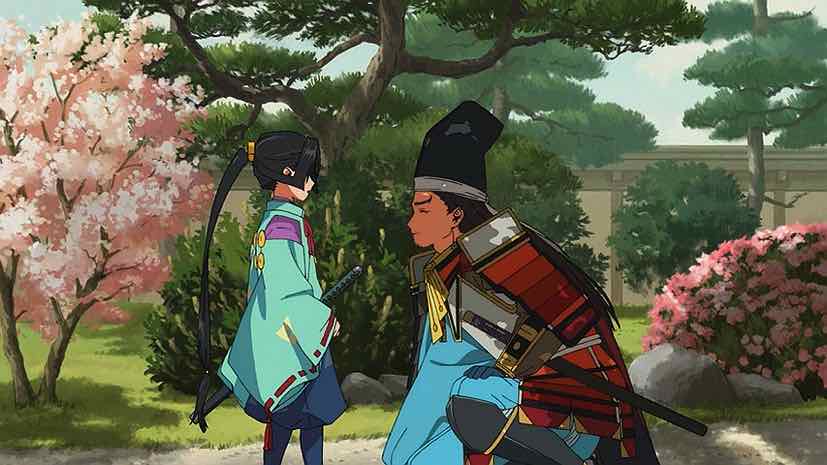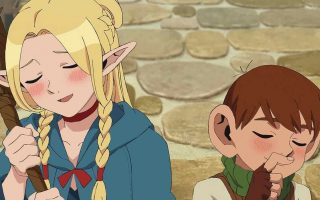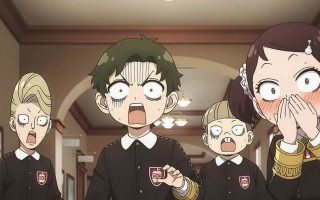OP: “Plan A (プランA)” by DISH//
It’s not often that I’m moved simply by how good the first episode of an adaption is. So the fact that I was almost in tears over Nige Jouzu no Wakagimi probably deserves some explanation. Yes, I’m a big fan of the manga, and that’s part of it. I don’t consider it flawless but I have a deep and abiding affection for it. But it’s more than that. If any series ever deserved a break, it’s The Elusive Samurai. And to see it get one in the form of a glorious adaptation (so far at least) from CloverWorks, something that could give the series a jolt of popularity, is really more than I ever dreamed.
I’ll be blunt – I’m sick and tired of seeing TES as routinely disrespected as it has been both by readers and its publisher. Matsui Yuusei came in off an absolute monster hit, Ansatsu Kyoushitsu (which ironically was anything but well-treated by anime). Fans of that series were not interested in Matsui trying something radically different (and doing it in Weekly Shounen Jump compounded the problem exponentially). Once it was clear that Nige Jouzu wasn’t going to be another kaibutsu Shueisha seemed to lose interest in it. It did well enough to keep serializing it, which with WSJ means to eventually get an anime. But as far as promotion goes it wasn’t worth their time. The message they were sending couldn’t be more clear.
Yet, somehow, we landed here. A first episode that creeps into Tengoku Daimakyou territory in terms of maximizing the potential of the material. This is not Production I.G./Wit or Bones (who Jump routinely turn to for their priority projects) but Cloverworks – the spinoff studio of A-1 Pictures that’s generally considered kind of mid. But they are capable of elite work when they get the money and have the right people on the job. And there were hints that The Elusive Samurai’s adaptation might be something special. The promotional material looked great, and a lot of really talented animators were known to be working on it. The vibes were good going in – but I didn’t dare hope for anything this good.
How did that happen? Did Shueshia see more in the series than I credited them for, or did it have some other champion high on the production committee ranking? I do know this – when the staff believes in the project, it makes an enormous difference. Bluntly, you can always tell (and that cuts both ways). The care is obvious here. The period dialogue is beautifully written. The art is sublime, and perfectly matches Matsui’s signature style. The music is exquisitely chosen, and even the OP and ED (directed by star animators) are works of art.
Let’s talk about Matsui’s art for a moment. Not everybody loves it, but I consider it among the finest in manga today. He doesn’t go for depth and tricks of perception – rather, I find his panels to have the look of frames from an art museum. And his character designs are truly beautiful – female and male, especially children. Seemingly that offers challenges in adaptation to anime (and AssClass may have showed what happens when indifferent production meets Matsui’s style). But The Elusive Samurai is the story of a boy who loves movement – the freedom it gives him both literally and spiritually. And this premiere is a stunning celebration of that passion.
I guess if one wants to put a genre on it, I’d call Nige Jouzu no Wakagimi a historical fantasy. It’s based on the life of Houjou Tokiyuki (Yuikawa Asaki). I won’t go into the whole history lesson thing here, but one can educate themselves as much as they care to on that – with the caveat that the history is full of spoilers. In sum, Tokiyuki is the heir to the Houjou Clan, the regents to the Kamakura Shogunate. The Kamakura Shogunate was established by Minamoto no Yoritomo after he defeated the Taira in the Genpei War. Houjou Tokimasa was the first regent to Yoritomo (ironic in that the Houjou are said to be descended from the Taira).
By the time Tokiyuki’s story begins, the Houjou were figureheads and his father was considered a puppet at best. History tells us that the samurai warlord Ashikaga Takauji (Konishi Katsuyuki) – a sworn vassal of the Houjou – was sent to Kyoto to quell a rebellion by the ousted Emperor Go-Daigo (which he had already done once). But he turned his coat, swore allegiance to Go-Daigo, razed Kamakura and murdered most of the Houjou there. Tokiyuki escaped, and in terms of Nige Jouzu, the rest is (literally) history. And given that the Kamakura Period is sadly almost totally unrepresented in anime, it’s about time.
That’s the framework, and the major historical events of the era are like road markers that The Elusive Samurai periodically takes a twisting route to get back to. The rest is fancy, more or less. The boy we meet here is a genius at hide and seek, which he uses to avoid the duties incumbent on him as heir. He’s only eight but Tokiyuki understands the nature of his family’s current role, and would gladly cede the role to his sensible elder brother Takatoki (Tadokoro Hinata). But that’s impossible as Takatoki is the child of a concubine. It all becomes moot, of course, on the fateful day Takauji’s treachery bears its bitter fruit.
Tokiyuki considers himself a coward, though his brother knows better. He’s away evading his responsibilities when the Ashikaga army attacks, and is appalled at what he sees. He’s ready to die, but the strange priest from Suwa Shrine in Shimano, Yorishige (Nakamura Yuuichi) tells him that the Regent’s last request was that he shelter the boy in Shimano. Yorishigi is an odd duck to say the least, a priest who claims to have the power of the Gods and the ability to see the future – which he says tells him Tokiyuki will become a hero and shake up the country. But having seen what he’s seen, Tokiyuki views it as his duty as a samurai to die along with his family.
If you saw Godzilla Minus One you’re well-familiar with this theme, and the outsized role it plays in the Japanese psyche. The perspective Matsui Yuusei brings to this series is summed up perfectly in Yorishige’s words to Tokiyuki – “Takauji became a hero by killing. You will become a hero by living.” Even now – never mind in the 14th Century – this is a pretty subversive idea here. This question of what makes a hero is very much at the heart of Nige Jouzu no Wakagimi and of Tokiyuki’s character arc.
Once again I say, this series just doesn’t get the respect it deserves. Matsui loves silliness and absurdist (and anachronistic) humor, but here he goes extremely dark actually achieves real profundity. It’s a sharp contrast to Assassination Classroom, which was innately juvenile – not in a bad way, but just the same. The darkness and depth of The Elusive Samurai went over like a lead balloon with a lot of fans of what had come before, who did not like being challenged as this series challenged them. Their loss. To see this flawed but truly special series finally get a chance to win over a receptive audience is all I could ever hope for as a fan. If the rest of the anime approaches the level of the first episode, I think it was a real chance.
ED: “Kamakura STYLE (鎌倉STYLE) by Botchi Boromaru (ぼっちぼろまる)
The post First Impressions – Nige Jouzu no Wakagimi (The Elusive Samurai) appeared first on Lost in Anime.




